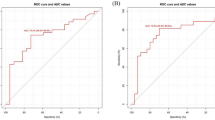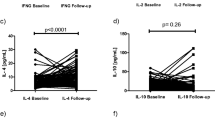Abstract
Introduction
Psoriasis is a chronic inflammatory disease with a strong genetic background, particularly the human leukocyte antigen (HLA). HLA-Cw6 has been shown to be the major disease susceptibility locus and affects the phenotypes and treatment response in psoriasis; however, the prevalence of HLA-Cw6 is far lower than HLA-Cw1 in some Asian countries.
Objectives
The aim of this study was to determine whether HLA-Cw1 predisposes psoriasis patients to different treatment responses of biologics and other systemic therapy.
Methods
This retrospective case-control study included 126 patients with moderate to severe plaque-type psoriasis who had been genotyped and treated in a special psoriasis clinic. HLA-Cw1-positive and -negative patients were compared.
Results
Our results showed that HLA-Cw1-negative patients were significantly more likely to respond (achieve Psoriasis Area and Severity Index [PASI] 75 after a 12- to 16-week treatment course) to biologics (including etanercept, adalimumab, ustekinumab, secukinumab, ixekizumab, and guselkumab; odds ratio [OR] 1.99, 95% confidence interval [CI] 1.17–3.44, p = 0.0122) and especially to ustekinumab (OR 3.27, 95% CI 1.03–11.30; p = 0.0496). An HLA-Cw1 allele dose effect was also found. The results remained after multivariate logistic regression analysis. HLA-Cw1-negative patients also showed significantly greater improvement of PASI in ustekinumab and biologics (p = 0.0044 and p = 0.0064, respectively), with other biologics showing non-significant trends. HLA-Cw1 status did not affect the treatment responses of non-biologic systemic treatment, including phototherapy.
Conclusion
There is an association between HLA-Cw1 and treatment response to biologics, but not to non-biologics, in our Asian population of patients with moderate to severe psoriasis; however, the exact mechanism and role of HLA-Cw1 remain to be investigated.

Similar content being viewed by others
References
Deng Y, Chang C, Lu Q. The inflammatory response in psoriasis: a comprehensive review. Clin Rev Allergy Immunol. 2016;50(3):377–89.
Nestle FO, Kaplan DH, Barker J. Psoriasis. N Engl J Med. 2009;361(5):496–509.
Griffiths CE, Barker JN. Pathogenesis and clinical features of psoriasis. Lancet. 2007;370(9583):263–71.
Strange A, Capon F, Spencer CC, Knight J, Weale ME, Allen MH, et al. A genome-wide association study identifies new psoriasis susceptibility loci and an interaction between HLA-C and ERAP1. Nat Genet. 2010;42(11):985–90.
Tsoi LC, Stuart PE, Tian C, Gudjonsson JE, Das S, Zawistowski M, et al. Large scale meta-analysis characterizes genetic architecture for common psoriasis associated variants. Nat Commun. 2017;8:15382.
Prinz JC. Autoimmune aspects of psoriasis: Heritability and autoantigens. Autoimmun Rev. 2017;16(9):970–9.
Chen L, Tsai TF. HLA-Cw6 and psoriasis. Br J Dermatol. 2018;178(4):854–62.
Chang YT, Tsai SF, Lee DD, Shiao YM, Huang CY, Liu HN, et al. A study of candidate genes for psoriasis near HLA-C in Chinese patients with psoriasis. Br J Dermatol. 2003;148(3):418–23.
Tiilikainen A, Lassus A, Karvonen J, Vartiainen P, Julin M. Psoriasis and HLA-Cw6. Br J Dermatol. 1980;102(2):179–84.
Chiu HY, Huang PY, Jee SH, Hu CY, Chou CT, Chang YT, et al. HLA polymorphism among Chinese patients with chronic plaque psoriasis: subgroup analysis. Br J Dermatol. 2012;166(2):288–97.
Huang YW, Tsai TF. HLA-Cw1 and psoriasis. Am J Clin Dermatol. 2021;22(3):339–47.
Choonhakarn C, Romphruk A, Puapairoj C, Jirarattanapochai K, Romphruk A, Leelayuwat C. Haplotype associations of the major histocompatibility complex with psoriasis in Northeastern Thais. Int J Dermatol. 2002;41(6):330–4.
Lo Y, Chiu HY, Tsai TF. Clinical features and genetic polymorphism in Chinese patients with erythrodermic psoriasis in a single dermatologic clinic. Mol Diagn Ther. 2020;24(1):85–93.
Ozawa A, Miyahara M, Sugai J, Iizuka M, Kawakubo Y, Matsuo I, et al. HLA class I and II alleles and susceptibility to generalized pustular psoriasis: significant associations with HLA-Cw1 and HLA-DQB1*0303. J Dermatol. 1998;25(9):573–81.
Mahil SK, Capon F, Barker JN. Update on psoriasis immunopathogenesis and targeted immunotherapy. Semin Immunopathol. 2016;38(1):11–27.
Gallo E, Cabaleiro T, Román M, Solano-López G, Abad-Santos F, García-Díez A, et al. The relationship between tumour necrosis factor (TNF)-α promoter and IL12B/IL-23R genes polymorphisms and the efficacy of anti-TNF-α therapy in psoriasis: a case-control study. Br J Dermatol. 2013;169(4):819–29.
Li K, Huang CC, Randazzo B, Li S, Szapary P, Curran M, et al. HLA-C*06:02 allele and response to IL-12/23 inhibition: Results from the ustekinumab phase 3 psoriasis program. J Investig Dermatol. 2016;136(12):2364–71.
Talamonti M, Botti E, Galluzzo M, Teoli M, Spallone G, Bavetta M, et al. Pharmacogenetics of psoriasis: HLA-Cw6 but not LCE3B/3C deletion nor TNFAIP3 polymorphism predisposes to clinical response to interleukin 12/23 blocker ustekinumab. Br J Dermatol. 2013;169(2):458–63.
Zhang Y, Ding X, Meng Z, Chen M, Zheng X, Cai M, et al. A Genome-wide association study identified HLA-C associated with the effectiveness of methotrexate for psoriasis treatment. J Eur Acad Dermatol Venereol. 2021;35(12):e898–900.
Dand N, Duckworth M, Baudry D, Russell A, Curtis CJ, Lee SH, et al. HLA-C*06:02 genotype is a predictive biomarker of biologic treatment response in psoriasis. J Allergy Clin Immunol. 2019;143(6):2120–30.
Hebert HL, Ali FR, Bowes J, Griffiths CEM, Barton A, Warren RB. Genetic susceptibility to psoriasis and psoriatic arthritis: implications for therapy. Br J Dermatol. 2012;166(3):474–82.
Tejasvi T, Stuart PE, Chandran V, Voorhees JJ, Gladman DD, Rahman P, et al. TNFAIP3 gene polymorphisms are associated with response to TNF blockade in psoriasis. J Invest Dermatol. 2012;132(3 Pt 1):593–600.
Gedebjerg A, Johansen C, Kragballe K, Iversen L. IL-20, IL-21 and p40: potential biomarkers of treatment response for ustekinumab. Acta Derm Venereol. 2013;93(2):150–5.
Talamonti M, D’Adamio S, Bianchi L, Galluzzo M. The role of pharmacogenetics in chronic plaque psoriasis: update of the literature. Mol Diagn Ther. 2017;21(5):467–80.
van den Reek J, Coenen MJH, van de L’Isle AM, Zweegers J, Rodijk-Olthuis D, Schalkwijk J, et al. Polymorphisms in CD84, IL12B and TNFAIP3 are associated with response to biologics in patients with psoriasis. Br J Dermatol. 2017;176(5):1288–96.
Chiu HY, Wang TS, Chan CC, Cheng YP, Lin SJ, Tsai TF. Human leucocyte antigen-Cw6 as a predictor for clinical response to ustekinumab, an interleukin-12/23 blocker, in Chinese patients with psoriasis: a retrospective analysis. Br J Dermatol. 2014;171(5):1181–8.
Talamonti M, Galluzzo M, Chimenti S, Costanzo A. HLA-C*06 and response to ustekinumab in Caucasian patients with psoriasis: outcome and long-term follow-up. J Am Acad Dermatol. 2016;74(2):374–5.
Stuart PE, Tejasvi T, Shaiq PA, Kullavanijaya P, Qamar R, Raja GK, et al. A single SNP surrogate for genotyping HLA-C*06:02 in diverse populations. J Invest Dermatol. 2015;135(4):1177–80.
Tsai TF, Hu CY, Tsai WL, Chu CY, Lin SJ, Liaw SH, et al. HLA-Cw6 specificity and polymorphic residues are associated with susceptibility among Chinese psoriatics in Taiwan. Arch Dermatol Res. 2002;294(5):214–20.
Fan X, Yang S, Sun LD, Liang YH, Gao M, Zhang KY, et al. Comparison of clinical features of HLA-Cw*0602-positive and -negative psoriasis patients in a Han Chinese population. Acta Derm Venereol. 2007;87(4):335–40.
Gonzaga HF, Torres EA, Alchorne MM, Gerbase-Delima M. Both psoriasis and benign migratory glossitis are associated with HLA-Cw6. Br J Dermatol. 1996;135(3):368–70.
Jobim M, Jobim LF, Salim PH, Cestari TF, Toresan R, Gil BC, et al. A study of the killer cell immunoglobulin-like receptor gene KIR2DS1 in a Caucasoid Brazilian population with psoriasis vulgaris. Tissue Antigens. 2008;72(4):392–6.
Martınez-Borra J, Brautbar C, Gonzalez S, Enk CD, López-Vázquez A, López-Larrea C. The region of 150 kb telometic to HLA-C is associated with psoriasis in the Jewish population. J Invest Dermatol. 2005;125(5):928–32.
Stuart PE, Nair RP, Hiremagalore R, Kullavanijaya P, Kullavanijaya P, Tejasvi T, et al. Comparison of MHC class I risk haplotypes in Thai and Caucasian psoriatics shows locus heterogeneity at PSORS1. Tissue Antigens. 2010;76(5):387–97.
Cai M, Huang H, Ran D, Zheng X, Wen L, Zhu Z, et al. HLA-C*01:02 and HLA-A*02:07 confer risk specific for psoriatic patients in Southern China. J Invest Dermatol. 2019;139(9):2045-8.e4.
Terui H, Yamasaki K, Hagiwara-Takita A, Shimada-Omori R, Tsuchiyama K, Saito-Nanjo Y, et al. Pediatric psoriasis induced by HLA-B46-Cw1 haplotype: a retrospective study of psoriasis onset after hematopoietic stem cell transplantation. J Dermatol. 2021;48(9):1381–5.
West J, Ogston S, Berg J, Palmer C, Fleming C, Kumar V, et al. HLA-Cw6-positive patients with psoriasis show improved response to methotrexate treatment. Clin Exp Dermatol. 2017;42(6):651–5.
Indhumathi S, Rajappa M, Chandrashekar L, Ananthanarayanan PH, Thappa DM, Negi VS. Pharmacogenetic markers to predict the clinical response to methotrexate in south Indian Tamil patients with psoriasis. Eur J Clin Pharmacol. 2017;73(8):965–71.
Milyausha Y, Rusian V, Fanil B, Zilya S, Leyla S, Bayazit Y. Psoriasis patients demonstrate HLA-Cw*06:02 allele dosage-dependent T cell proliferation when treated with hair follicle-derived keratin 17 protein. Sci Rep. 2018;8(1):6098.
De Simone C, Farina M, Maiorino A, Fanali C, Perino F, Flamini A, et al. TNF-alpha gene polymorphisms can help to predict response to etanercept in psoriatic patients. J Eur Acad Dermatol Venereol. 2015;29(9):1786–90.
Masouri S, Stefanaki I, Ntritsos G, Kypreou KP, Drakaki E, Evangelou E, et al. A pharmacogenetic study of psoriasis risk variants in a Greek population and prediction of responses to anti-TNF-alpha and anti-IL-12/23 agents. Mol Diagn Ther. 2016;20(3):221–5.
Batalla A, Coto E, Coto-Segura P. Influence of Fcgamma receptor polymorphisms on response to anti-tumor necrosis factor treatment in psoriasis. JAMA Dermatol. 2015;151(12):1376–8.
Galluzzo M, Boca AN, Botti E, Potenza C, Malara G, Malagoli P, et al. IL12B (p40) gene polymorphisms contribute to ustekinumab response prediction in psoriasis. Dermatology. 2016;232(2):230–6.
Chiu TS, Tsai TF. Treatment response in patients with moderate to severe psoriasis who had inadequate response to prior secukinumab. Dermatol Sin. 2019;37(3):129–33.
Huang YW, Tsai TF. Efficacy of tofacitinib in patients with moderate to severe psoriasis who had inadequate responses to prior biologics. Dermatol Sin. 2019;37(4):205–8.
Lo Y, Huang YH, Tsai TF. Long-term efficacy and safety of ixekizumab in the treatment of patients with history of chronic erythrodermic psoriasis who failed prior secukinumab: a bicentric retrospective study. Dermatol Sin. 2021;39(2):87–8.
Langley RG, Tsai TF, Flavin S, Song M, Randazzo B, Wasfi Y, et al. Efficacy and safety of guselkumab in patients with psoriasis who have an inadequate response to ustekinumab: results of the randomized, double-blind, phase III NAVIGATE trial. Br J Dermatol. 2018;178(1):114–23.
Huang YW, Tsai TF. Exacerbation of psoriasis following COVID-19 vaccination: report from a single center. Front Med (Lausanne). 2021;8: 812010.
Author information
Authors and Affiliations
Corresponding author
Ethics declarations
Funding
No sources of funding were received to assist in the preparation of this article.
Conflicts of interest/competing interests
Shin-Shin Ho has no conflicts of interest that are directly relevant to the contents of this article. Tsen-Fang Tsai has conducted clinical trials or received honoraria for serving as a consultant for Abbvie, Boehringer Ingelheim, Bristol-Myers Squibb, Celgene, Eli Lilly, Galderma, Janssen-Cilag, Merck Sharp & Dohme, Novartis International AG, Pfzer Inc., and UCB Pharma.
Ethics approval
This study has been approved by the local Institutional Review Board (20190412RINC, 200712123R).
Consent to participate and for publication
All patients provided written informed consent.
Data availability
The data that support the findings of this study are available from the corresponding author upon reasonable request.
Code availability
Not applicable.
Authors’ contributions
All authors contributed to the study conception and design. The literature search and data analysis were performed by Shin-Shin Ho and Tsen-Fang Tsai. The first draft of the manuscript was written by Shin-Shin Ho and all authors commented on previous versions of the manuscript. All authors read and approved the final manuscript.
Rights and permissions
About this article
Cite this article
Ho, SS., Tsai, TF. Associations between HLA-Cw1 and Systemic Treatment Response of Asian Psoriasis Patients. Mol Diagn Ther 26, 541–549 (2022). https://doi.org/10.1007/s40291-022-00603-4
Accepted:
Published:
Issue Date:
DOI: https://doi.org/10.1007/s40291-022-00603-4




